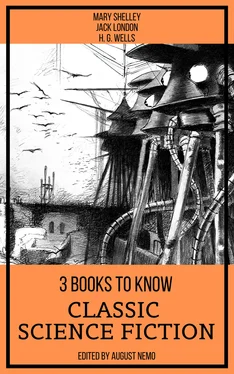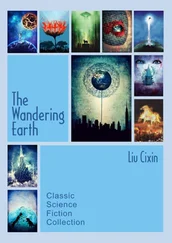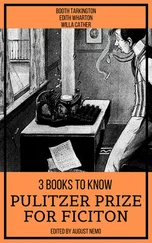“Well,” said the lieutenant, “I suppose it’s my business to see it too. Look here”—to the artilleryman—“we’re detailed here clearing people out of their houses. You’d better go along and report yourself to Brigadier-General Marvin, and tell him all you know. He’s at Weybridge. Know the way?”
“I do,” I said; and he turned his horse southward again.
“Half a mile, you say?” said he.
“At most,” I answered, and pointed over the treetops southward. He thanked me and rode on, and we saw them no more.
Farther along we came upon a group of three women and two children in the road, busy clearing out a labourer’s cottage. They had got hold of a little hand truck, and were piling it up with unclean-looking bundles and shabby furniture. They were all too assiduously engaged to talk to us as we passed.
By Byfleet station we emerged from the pine trees, and found the country calm and peaceful under the morning sunlight. We were far beyond the range of the Heat-Ray there, and had it not been for the silent desertion of some of the houses, the stirring movement of packing in others, and the knot of soldiers standing on the bridge over the railway and staring down the line towards Woking, the day would have seemed very like any other Sunday.
Several farm waggons and carts were moving creakily along the road to Addlestone, and suddenly through the gate of a field we saw, across a stretch of flat meadow, six twelve-pounders standing neatly at equal distances pointing towards Woking. The gunners stood by the guns waiting, and the ammunition waggons were at a business-like distance. The men stood almost as if under inspection.
“That’s good!” said I. “They will get one fair shot, at any rate.”
The artilleryman hesitated at the gate.
“I shall go on,” he said.
Farther on towards Weybridge, just over the bridge, there were a number of men in white fatigue jackets throwing up a long rampart, and more guns behind.
“It’s bows and arrows against the lightning, anyhow,” said the artilleryman. “They ’aven’t seen that fire-beam yet.”
The officers who were not actively engaged stood and stared over the treetops southwestward, and the men digging would stop every now and again to stare in the same direction.
Byfleet was in a tumult; people packing, and a score of hussars, some of them dismounted, some on horseback, were hunting them about. Three or four black government waggons, with crosses in white circles, and an old omnibus, among other vehicles, were being loaded in the village street. There were scores of people, most of them sufficiently sabbatical to have assumed their best clothes. The soldiers were having the greatest difficulty in making them realise the gravity of their position. We saw one shrivelled old fellow with a huge box and a score or more of flower pots containing orchids, angrily expostulating with the corporal who would leave them behind. I stopped and gripped his arm.
“Do you know what’s over there?” I said, pointing at the pine tops that hid the Martians.
“Eh?” said he, turning. “I was explainin’ these is vallyble.”
“Death!” I shouted. “Death is coming! Death!” and leaving him to digest that if he could, I hurried on after the artillery-man. At the corner I looked back. The soldier had left him, and he was still standing by his box, with the pots of orchids on the lid of it, and staring vaguely over the trees.
No one in Weybridge could tell us where the headquarters were established; the whole place was in such confusion as I had never seen in any town before. Carts, carriages everywhere, the most astonishing miscellany of conveyances and horseflesh. The respectable inhabitants of the place, men in golf and boating costumes, wives prettily dressed, were packing, river-side loafers energetically helping, children excited, and, for the most part, highly delighted at this astonishing variation of their Sunday experiences. In the midst of it all the worthy vicar was very pluckily holding an early celebration, and his bell was jangling out above the excitement.
I and the artilleryman, seated on the step of the drinking fountain, made a very passable meal upon what we had brought with us. Patrols of soldiers—here no longer hussars, but grenadiers in white—were warning people to move now or to take refuge in their cellars as soon as the firing began. We saw as we crossed the railway bridge that a growing crowd of people had assembled in and about the railway station, and the swarming platform was piled with boxes and packages. The ordinary traffic had been stopped, I believe, in order to allow of the passage of troops and guns to Chertsey, and I have heard since that a savage struggle occurred for places in the special trains that were put on at a later hour.
We remained at Weybridge until midday, and at that hour we found ourselves at the place near Shepperton Lock where the Wey and Thames join. Part of the time we spent helping two old women to pack a little cart. The Wey has a treble mouth, and at this point boats are to be hired, and there was a ferry across the river. On the Shepperton side was an inn with a lawn, and beyond that the tower of Shepperton Church—it has been replaced by a spire—rose above the trees.
Here we found an excited and noisy crowd of fugitives. As yet the flight had not grown to a panic, but there were already far more people than all the boats going to and fro could enable to cross. People came panting along under heavy burdens; one husband and wife were even carrying a small outhouse door between them, with some of their household goods piled thereon. One man told us he meant to try to get away from Shepperton station.
There was a lot of shouting, and one man was even jesting. The idea people seemed to have here was that the Martians were simply formidable human beings, who might attack and sack the town, to be certainly destroyed in the end. Every now and then people would glance nervously across the Wey, at the meadows towards Chertsey, but everything over there was still.
Across the Thames, except just where the boats landed, everything was quiet, in vivid contrast with the Surrey side. The people who landed there from the boats went tramping off down the lane. The big ferryboat had just made a journey. Three or four soldiers stood on the lawn of the inn, staring and jesting at the fugitives, without offering to help. The inn was closed, as it was now within prohibited hours.
“What’s that?” cried a boatman, and “Shut up, you fool!” said a man near me to a yelping dog. Then the sound came again, this time from the direction of Chertsey, a muffled thud—the sound of a gun.
The fighting was beginning. Almost immediately unseen batteries across the river to our right, unseen because of the trees, took up the chorus, firing heavily one after the other. A woman screamed. Everyone stood arrested by the sudden stir of battle, near us and yet invisible to us. Nothing was to be seen save flat meadows, cows feeding unconcernedly for the most part, and silvery pollard willows motionless in the warm sunlight.
“The sojers’ll stop ’em,” said a woman beside me, doubtfully. A haziness rose over the treetops.
Then suddenly we saw a rush of smoke far away up the river, a puff of smoke that jerked up into the air and hung; and forthwith the ground heaved under foot and a heavy explosion shook the air, smashing two or three windows in the houses near, and leaving us astonished.
“Here they are!” shouted a man in a blue jersey. “Yonder! D’yer see them? Yonder!”
Quickly, one after the other, one, two, three, four of the armoured Martians appeared, far away over the little trees, across the flat meadows that stretched towards Chertsey, and striding hurriedly towards the river. Little cowled figures they seemed at first, going with a rolling motion and as fast as flying birds.
Читать дальше












